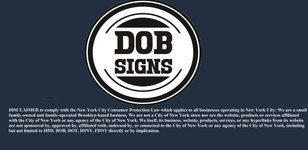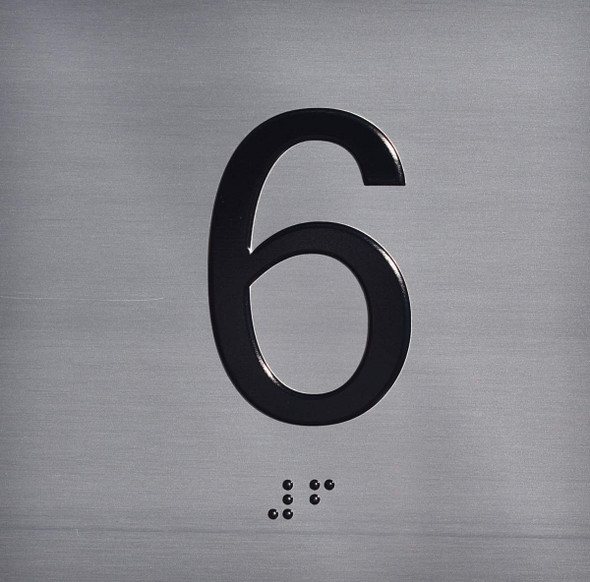DOB SIGNS
7TH Floor Elevator Jamb Plate Sign- with Braille and Raised Number-Elevator Floor Number Sign-(Silver)
- UPC:
- 757059963014
- Availability:
- USUALLY SHIP WITH IN 1-2 BUSINESS DAY
Description
7TH Floor Elevator Jamb Plate Sign with Braille and Raised Number-Elevator Floor Number Sign - (Silver)
About The sign:
Size: 4x4
Tactile Signs (Raised Print and Braille): yes
Material: Aluminum
Raised letter and Pictogram: Yes
Braille (dots): Yes
The jamb plate sign design to inform guest and 1st responded the floor the elevator located. The owner of the building should put on each side of the jamb the 4x4 jamb plate that indicates the floor number. Our Jamb plate are from Aluminum and come with heavy duty double sided sticker at the back for easy installation. All plates include floor numbers or letters in tactile acrylic and Grade 2 Braille. Our Elevator car and jamb plates available in multiple colors, these plates include permanent adhesive with easily removed backing. Just peel and stick to your elevator control panel or door jamb.
This is Aluminum Jamb plate sign also can use as an Apartment number sign. Elevator signs - Square 4” x 4” Elevator Jamb Number sign with tactile text/graphics and grade 2 braille. Please indicate in the “special instructions” below which floor in your building is the main entry level where the closest accessible exit can be found and we will automatically includes the required star symbol on that sign.
What is the metal plate that fastens the door jamb? A strick plate is the metal piece attached to the door jamb.
These acrylic signs are 1/8” thick and are offered in a wide variety of two-color, ADA compliant color combinations. Wood and brushed metal finishes available.
This SIGN is made from aluminum and come with Double sided tape. We Provide all Braille signs, ada signs and tactical signs all United states. Our Signs are from aluminum raised letter and raised images as needed This Braille signs is NOT from plastic but aluminum.
Tactile Signs (Raised Print and Braille)-A tactile sign is any sign that can be read by touch. Braille, raised print and raised symbols or pictograms are examples of tactile elements used on signs. Doors and openings that lead to public spaces should be identified by tactile signage.
Raised Print Signs-Raised print signs are useful for people with no vision at all or for people whose remaining vision is sufficient to allow them to locate a sign but not sufficient to read it. Some people impacted by blindness, especially those born with little or no vision, may not know what print looks like and may be unable to read raised print. For this reason, all raised print signs should be accompanied by Braille lettering.
Braille Signs-Braille signage is essential for accessibility of information to individuals who exclusively use Braille. Use Braille signs consistently to identify key features in the built environment or direction signage in the building.
The most effective location for a tactile sign is on the wall on the latch side of a door or opening
Americans with Disabilities Act (ADA) standards ensure that everyone finds your building accessible. These standards extend to a variety of features in a building--including your signage. It is imperative that your signs are ADA compliant when necessary. This refers to making sure visually impaired occupants can read your sign, and the standards are very specific.
What kind of signs need to be ADA compliant?
ADA signs are often found indoors or at the entrance of a building. If a sign identifies a permanent room or space, it must adhere to the guidelines. Adherence is also required for signs indicating exits, elevators, and restrooms--as well as signs that direct occupants or inform them about the accessible features of your building. ADA parking signs are the blue signs that indicate handicapped parking spaces.
What does being ADA compliant mean?
Because the main purpose of ADA signs is to identify accessible features and be readable for visually impaired occupants, they need to include clear visual characters as well as tactile characters. Tactile characters are either raised letters or braille. Simply including tactile characters isn’t enough. The visual letters also must adhere to certain standards--including the height and spacing of the characters. They need to be readable by occupants with low vision.
General rules for ADA signs include:
The background and characters must contrast (light on dark or dark on light) and.
Visual characters must use an easy-to read font that is not italic, script, or otherwise unconventional and decorative.
If the sign identifies a room, it must be adjacent to the door at the proper height
The International Symbol of Access must be standard rather than stylish
Proper ADA signage is required in order to obtain a certificate of occupancy for your building. Many business owners and landlords overlook this requirement because of their busy schedules, and they get an unwelcome surprise when the building inspector comes. All buildings need to be compliant, no matter what kind of business or establishment you have.
American disability Act (ADA) signs are building signs that are specifically designed to ensure people with disabilities the same access and functionality to business facilities as people without disabilities. ADA signs must present the same information to every person regardless of physical limitations. New York, California and many other states require building owners to install per the American disability act (ADA) signs that have raised image, raised letters and Braille below. The signs need to have strong contrast between the letters and Braille at the bottom.
You can find some Frequently Asked Questions about our signs and ada signs below:
Do ADA requirements extend to Braille signage? The 2010 ADA Standards for Accessible Design (ADAAG) stipulates a braille standard for ADA signs requiring braille. In 1980 California was the first state to establish its own braille standard, known as “California (Title 24) Braille”, and mandate its use for ADA signs across the state.
What does ADA mean? Americans with Disabilities Act of 1990 Americans with Disabilities Act of 1990/Full name
Do all ADA signs need Braille? BRAILLE OR NO BRAILLE: Though the 2010 ADAAG guideline sets standards for braille signs, it does not stipulate where in a building braille signs are required. However, the ADA Standards for Accessible Design (1994) does require that signs designating permanent rooms and spaces must have raised characters and braille.
Where are ADA signs required? ADA signs should be installed no lower than 48 inches from the floor and no higher than 60 inches from the floor. If there is not enough space to mount the sign in the specified location, it may be installed on the nearest adjacent wall in a clearly visible location. ADA signs should not be mounted directly on a door
What is tactile text? A Tactile text is a raised surface that a visually impaired person can feel. They are with strong contrast background so visually impaired persons can locate them easily
What makes a sign ADA compliant? All ADA-compliant signs must have backgrounds and characters that do not create any glare, unless the signs are for parking or traffic. People who have vision impairments are not able to process glare or reflection very well, especially elderly people
Shipping and Handling Cost:
Our Shipping is fixed whether you buy 1 item or 20 items (We ship within USA only) - do not miss this opportunity to buy all signs needed at no additional shipping cost.
Sales Tax:
We are required to collect sales tax on any product sold on this site and shipped to an address in New York. The sales tax is 8.875 percent.
DISCLAIMER to comply with the New York City Consumer Protection Law which applies to all businesses operating in New York City: HPD-signs.com is a small family-owned and family-operated Brooklyn-based business. HPD-signs.com is not a City of New York store nor are the website, products or services affiliated with the City of New York or any agency of the City of New York. HPD-signs.com itself, its business, website, products, services, or any hyperlinks from its website are not sponsored by, approved by, affiliated with, endorsed by, or connected to the City of New York or any agency of the City of New York, including but not limited to HPD, DOB, DOT, DSNY, FDNY directly or by implication.
The requirements for sign content are determined by intended use and by applicable regulation. The BUYER is responsible for determining the appropriate content for a sign or package of signs. We makes no warranty or representation of suitability of a sign for any specific application. IT IS THE CUSTOMER'S RESPONSIBILITY TO ENSURE THAT THE SIGNS THE CUSTOMER ORDERS ARE IN COMPLIANCE WITH ALL STATE, FEDERAL, LOCAL, AND MUNICIPAL LAWS. Please review terms and conditions prior to purchase.
The codes may not be the most recent version. The State / federal or other regulation department may have more current or accurate information. We make no warranties or guarantees about the accuracy, completeness, or adequacy of the information contained on this site or the information linked to on the state site. Please check official sources.
For more information about what is required, see the laws that are referenced and the rules applicable to your city and state. This page is for informational purposes only and is not intended as legal advice, professional advice or a statement of law. You may wish to consult with an attorney.
We provide both signs required by city and state regulation and Property Management Signs , DOB Signs , Hallway Signs , HPD Signs , Fire Department Signs , Floor Identification Signs , Door Signs , Building Directional Signs , Floor Number Signs , Building Signs , Silver Signs, ADA signs and many more in stock and ready to ship.
























